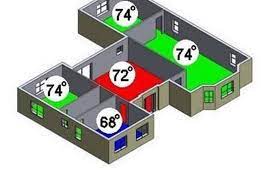With HVAC zoning, you can individually control the comfort levels in different areas of your home independently. This allows you to have a different setting in the living room than the bedroom for example. Not only does this make your home more comfortable…it’s more energy efficient and will save you money in the long run.
What is HVAC Zoning exactly?
HVAC zoning is the process of heating and cooling your home so that specific areas can have their own temperature control. You might set up different conditions for each area. Like cooled bedrooms at night while focusing on a comfortable kitchen/living room atmosphere with air conditioning during day time periods. This gives you ultimate customization over how warm or cold it feels inside the different areas of your home.
Benefits of HVAC Zoning
Improved efficiency: You’re using less electricity to keep your home pleasant since a zoned system diverts air away from regions that don’t require it. Zoning is more efficient than just closing the air vents in each room as dampers provide a tighter seal.
Comfort levels that are tailored to you: Do you have thermostat conflicts in your house between the family? A zoned HVAC system can put an end to these by allowing everyone to customize the temperatures independently for each area of the home to their own comfort levels.
Even Temperatures: A zoned HVAC system can help to compensate for hot and cold spots in the house. The system will meet your heating and cooling needs by zone, so regions that are naturally cooler may get the additional heat they require without pushing excessive heat into warm zones or rooms.
How Does HVAC Zoning Work?
When it comes to HVAC zoning, there’s a few options on making it work. Lets go over them:
Dampers in Ductwork
In most furnace systems, a single thermostat regulates the temperature of the hot air and it is distributed throughout the ductwork without any variations in airflow to meet the demands of individual rooms. Adding dampers to branches and utilizing each damper to open and close depending on the requirements of each zone thermostat allows for more precise control over each region in your home.
Control valves with thermostats
For hot water heating systems, each radiator may have a control valve that opens and shuts when the space thermostat orders heat. You can also connect radiators in a specific area together and operate them with a thermostat that serves the shared spaces. .
Supplemental Heat in Critical Rooms
If dampers are not appropriate for your home’s system (for example, because of duct layout), adding extra heat to a space that doesn’t receive enough can be the best option. It may be possible that one room or area in your home is colder than the rest while at the same time the remainder of your property remains comfortable. e. If you add another heat source to this one room, you’ll only use what you need. Therefore, you won’t have to overheat the rest of your house to be comfortable.
MiniSplit or Decentralized HVAC System
Because of its decentralized nature, a mini-split is more flexible and adaptable than a central heating system. Individual thermostats control each piece of equipment in a decentralized system, which makes it more versatile and flexible than a centralized heating system. For example, several heat pumps might be used to serve numerous rooms or groups of rooms at once.
Boosted Air Circulation
If your house is prone to air stratification, in which hot air stays at the top near the ceiling and cooler air sinks, making you cold, you might benefit from increased ventilation to protect against this zone. Instead of attempting to change your entire home’s system to better accommodate this issue area, a targeted solution can provide consistent control and comfort.
Is HVAC Zoning The Right Decision for Your Home?
Zoned heating and cooling works best in larger houses with plenty of room to separate into zones. Because their house’s design encourages distinct temperatures, some families get much more value out of zoning their home.
We recommend that you have one or more of the following:
- Multi-Story home.
- Basement.
- Attic
- High Ceilings
- Living Space on top of the Garage
- A sunroom or add-on.
- Large Windows
- A wide lay out with 2 or more wings.
Need help deciding what the best options are for your home? Give us a call at 301-401-2780 or shoot as a message. Dave’s is always happy to help!.


























